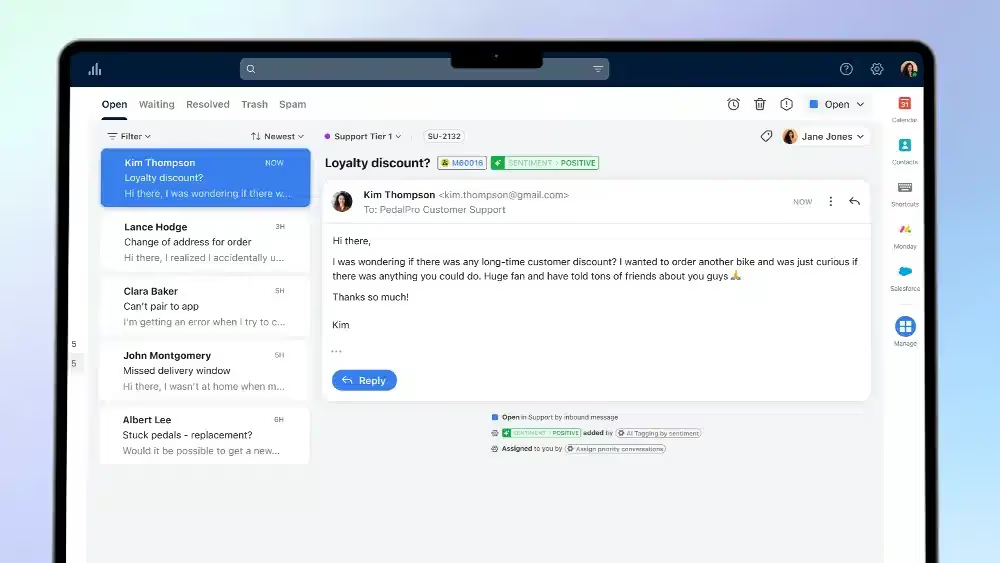
Credit: resultscx.com (edited)
EEOC settlement highlights the high cost of ignoring assistive tech in call centers
Key points
- A $250,000 settlement resolves a lawsuit against The Results Companies for alleged ADA violations involving a blind call center employee.
- The EEOC claims the company failed to install necessary screen reader software, leading to the employee's dismissal.
- The case highlights the EEOC's stance that employers must engage in meaningful dialogue to accommodate disabilities.
A flawed tech integration, which resulted in the dismissal of a blind worker, has cost a business services firm $250,000. The case sends a signal that the EEOC won't accept technical hurdles as a blank check to sideline workers with disabilities, especially when the cost of exclusion far outweighs the investment in inclusion.
Breach of ADA alleged: The Results Companies, LLC, a Florida-based call center operator, has agreed to the quarter-million-dollar payout to settle a disability discrimination lawsuit brought by the U.S. Equal Employment Opportunity Commission, the agency announced recently. The suit, originally filed in September 2024, alleged the company violated the Americans with Disabilities Act (ADA) by failing to accommodate and ultimately firing a blind call center agent who needed screen reader software to perform her job.
A breakdown in accommodation: The core of the EEOC's case centered on the company's alleged failure to navigate the ADA's required "interactive process" when faced with integrating assistive technology. The employee, hired in Texas in July 2019, requested Job Access With Speech (JAWS) software, according to CX Dive. An IT specialist reportedly found the employee's provided software outdated. In August 2019, the company allegedly asked the employee to step down until she could get an updated version.
Although Texas Workforce Solutions reportedly purchased the upgrade in November 2019 and the employee returned in December, the company allegedly still hadn't installed it. Critically, the EEOC charged, The Results Companies refused the employee’s suggestions to contact her vocational counselor, or the JAWS publisher, for technical help and “did not avail itself of the free resources” offered to make the software compatible. The employee was fired on February 3, 2020.
Tech hurdles no excuse: This alleged inaction flies in the face of EEOC expectations, particularly following the agency's detailed guidance on visual disabilities issued in July 2023. That guidance explicitly lists screen readers as a common reasonable accommodation and emphasizes the employer's duty to engage in a meaningful dialogue. "Generalized conclusions will not support a claim of undue hardship," warned Travis Nicholson, director of the EEOC’s Dallas District Office, in the settlement announcement. "It is important for employers to meaningfully participate in the interactive process... and gather information specific to the situation at hand, even if they may not be familiar with the requested accommodation."
EEOC trial attorney Alexa Lang added that accommodating screen readers like JAWS "is not automatically an undue hardship," requiring employers to "meaningfully assess their technical capabilities and available resources." Robert Canino, regional attorney for the Dallas office, noted when the suit was filed that software like JAWS "has long been available and successfully integrated," setting the expectation that employers should determine how such tools can be applied.
The high cost of exclusion: Beyond the legal mandate, the $250,000 settlement underscores the operational and economic folly of failing to integrate necessary assistive technology. Sidelining a qualified, trained call center agent over solvable technical issues represents a direct hit to productivity and talent retention, likely costing the company far more in legal fees, settlement payouts, and lost workforce capacity than proactive technical support and accommodation would have. Inaccessible tech stacks become a barrier not just to compliance, but to leveraging the full talent pool.
Results Co. pushes back: A spokesperson for The Results Companies told CX Dive that the company "vigorously denies any allegation or inference that we treated anyone in an unlawful manner." The spokesperson added that the firm is an equal opportunity employer "committed to having a diverse and inclusive workforce" and that it employs "many individuals with disabilities."
Mandated course correction: The settlement, approved by U.S. District Judge Reed O’Connor, includes a two-year consent decree. According to the EEOC's announcement, The Results Companies must provide internal ADA training and, significantly, implement a specific plan for handling future accommodation requests involving screen reader technology.



